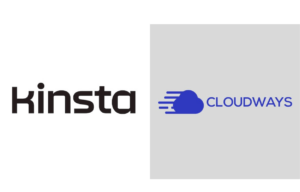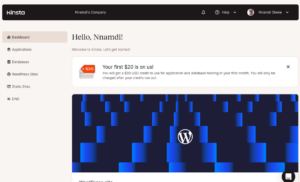8 Best Cloud Hosting Platforms in 2024

Cloud hosting is the most efficient method of running web applications today. But to get the best results, you need to host with a good provider.
The best cloud hosting platforms make it easy to deploy and manage your applications; hence they mask the immense complexity that makes computer clouds such powerful systems. In the end, you gain the benefits of the cloud, with as little headache as possible.
There are many cloud hosting service providers out there, but they are not all equal. So, this post lists the top 8 of the bunch, plus helpful tips to help you make the right choice.
How To Choose The Best Cloud Provider
There are a few considerations to make when choosing the best cloud host for your website. These range from performance to security and usability. Here are these issues to consider.
- Performance: Most cloud platforms offer better performance than shared hosting services. However, you still need to be aware of what is being offered. How much CPU, RAM, or storage are you getting? How good is the virtual machine’s performance, how much traffic is included? And so on.
- Security: Security is another major consideration and ranges from user authentication services to DDoS protection, firewalls, SSL certificates, and regular backups. Some providers offer in-house security features, while others use third-party security services like Cloudflare.
- Resilience: The beauty of cloud computing is that an application’s execution environment can be spread out across various physical servers in different locations. This equally means that a provider with more data centers will offer a more resilient platform for those who need resilience.
- User Friendliness: Cloud technology is inherently complex and left that way, many potential users will be discouraged from adopting cloud hosting. So, any provider that simplifies its operations and makes things easier for the customer is providing lots of value. If you are technically oriented, then feel free to try out IaaS offers like GCP and AWS. Otherwise, you may be better off with simplified PaaS offers like Cloudways and Vultr.
- Pricing Plans: Flexibility and pay-as-you-go pricing is common with most cloud infrastructure providers. However, some providers offer specialized accounts for specific applications, such as WordPress. In such situations, the service you get will determine how good or bad the pricing really is.
- Help & Customer Support: All cloud hosting platforms offer 24/7 customer support and documentation. However, while some offer only chat-based support, other providers include phone support systems or priority support for an extra fee.
Best Cloud Hosting Providers
| Rank | Name | Best For | Pricing |
|---|---|---|---|
| 1. | Google Cloud | High Performance, Top Security | Pay-as-you-go |
| 2. | Cloudways | Managed Hosting | From $14 / month |
| 3. | Kinsta | WordPress Hosting | Freemium |
| 4. | AWS | Large & Comprehensive | Pay-as-you-go |
| 5. | DreamHost | Fast SSD Storage | From $4.50 / month |
| 6. | Hostinger | Integrated Website Builder | From $19.99 / month |
| 7. | Vultr | Budget Cloud Hosting | From $2.50 / m |
| 8. | Netlify | Fast Development & Static Sites | Freemium |
1. Google Cloud Platform
Best For Overall performance & security
Features:
- Enterprise-grade Infrastructure-as-a-Service
- Extensive network and throughput
- Free tier products
- Unlimited application scaling
Cloud Type: IaaS and PaaS
Pricing: Pay-as-you-go
Free Trial: $300 free credit
If you are looking for an easy-to-understand cloud platform to build and scale all types of applications, then Google Cloud might be what you need. It comes with Google’s well-known security and reliability features, including 150+ products to choose from.
The Google Cloud platform lets you build and scale all types of apps using cloud storage, compute engines, Kubernetes, petabyte-scale databases, serverless environments, and all types of AI and machine learning products from NLP to speech and visuals.
You should note that Google Cloud might be “too much” for you if you are just looking to run a blog in the cloud. However, if you are building a custom application that you hope to scale in the future, then it’s definitely worth your time.
Google Cloud also includes a free tier that offers 25+ products with limited usage each month for free. Plus, new customers get $300 in free credits to run, test, and deploy their applications.
2. Cloudways
Best For: Managed Cloud Hosting
Features:
- Intuitive and user-friendly interface
- Choice of server from top providers
- 1-click installation of popular applications
- Auto-scaling, auto backups, and free SSL
Cloud Type: PaaS
Pricing: From $14 per month
Free Trial: 3-day no credit-card trial
Cloudways is a unique cloud offering that makes it easy to subscribe to the best cloud providers and easily manage your subscriptions and applications using their user-friendly interface. It allows you to choose a server host between AWS, Google Cloud, and DigitalOcean. Then you select a plan and are ready to install applications.
The Cloudways platform supports several applications with 1-click installation – such as WordPress, Laravel, Joomla, WooCommerce, Magento, and so on. It is built upon Google Kubernetes engine and supports automatic scaling and load balancing.
Pricing depends on the server provider that you choose, with DigitalOcean offering the lowest price at $14 per month for a 1G RAM server with 1 core CPU, 25 GB storage, and 1 TB of bandwidth.
Other features include 24/7 support, free migration of your apps, unlimited application installations on your rented server, firewalls, Cloudflare CDN, staging environment, SSH/SFTP access, and many more.
3. Kinsta
Best For: Managed WordPress Hosting
Features:
- Host WordPress, web apps, and databases
- Flexible plans and pricing
- Free hosting for static sites
- Free standard and premium migrations
Cloud Type: PaaS
Pricing: Freemium
Free Trial: $20 for app and database hosting only
If you are looking to host just a WordPress site in the cloud, then you should consider Kinsta Hosting, the specialist for hosting managed WordPress sites. Plans start at $30 per month for a single site and include free migrations, 10 GB storage, and 25,000 visits.
A Pro plan includes 2 sites, while the various Business plans come with more features and pricing. Kinsta also offers free hosting of static sites, as well as scalable databases and applications for $18 per month and $7 per month respectively.
Each plan includes 1 free premium migration of WordPress sites and unlimited standard migrations. A CDN is included with 260+ points of presence. Plus, you can add as many users as you like to your account.
4. AWS
Free Trial: Free tier products & credits
Features:
- Large selection of features and products
- Enterprise-grade resources for all business sizes
- Includes free service tier products
- Very popular cloud platform
Cloud Type: IaaS and PaaS
Pricing: Pay-as-you-go
Best For: Large & comprehensive network
Amazon Web Services or AWS is the largest cloud service provider with comprehensive features from compute power, database storage, AI and machine learning services, networking, and so on.
The platform combines IaaS and PaaS services to offer individuals and companies (small and large) everything they need from one cloud provider, including AI products, developer tools, networking, games, serverless computing, elastic computing services, and so many more.
If you are looking to hire cloud engineers to get your project done, then AWS might also be the best choice for you, given its huge popularity with businesses and software engineers alike.
5. DreamHost
Best For: Fast SSD storage
Features:
- Fast SSD disks on all plans
- Full root access servers
- Features maximum pricing approach
- Flexible plans
Cloud Type: PaaS
Pricing: From $4.5 per month
Free Trial: N/A
DreamHost is a cloud provider that exclusively offers SSD storage on all its plans. SSD stands for Solid State Drives and is a faster, more resilient, and modern method of data storage (different from magnetic harddisks with their moving parts and limited speeds). Many hosting providers offer SSD as a premium addition.
You can get a DreamHost account with 1 vCPU, 512 MB RAM, 80 GB SSD storage, and unlimited free bandwidth for a maximum of $4.5 per month. This maximum pricing method means that you are only charged for a maximum of 25 days or 600 hours a month – if you use fewer resources, then good for you, if you use more, also good.
6. Hostinger
Best For: No-code website builder
Features:
- 2 CPU server with 3 GB RAM
- Includes a free domain and migration
- Allows up to 300 websites
Cloud Type: PaaS
Pricing: From $19.99 per month
Free Trial: N/A
Hostinger is popular for shared hosting plans starting from as low as $7.99 per month, but it also offers cloud hosting plans starting from $19.99 per month.
This plan comes with a 2-CPU core system, 3 GB of RAM, and 200 GB of NVMe storage. It also includes a free domain, email, SSL, unlimited bandwidth, and a dedicated IP address. It allows you to host up to 300 websites.
You also get managed WordPress services with 1-click installation, free migration, and tons of related features. Plus, there is a no-code website builder with drag-and-drop functionality, AI support, and lots of marketing and SEO tools.
7. Vultr
Best For: Budget solutions
Features:
- High-performing low-cost cloud solutions
- Flexible hard- and software configurations
- 1-click deployment of WordPress, Joomla, etc
Cloud Type: PaaS, IaaS
Pricing: From $2.50 per month
Free Trial: Free credits available
Users in search of a high-performance but low-priced cloud solution should consider Vultr. This cloud hosting platform offers every configuration from cloud computing machines to NVIDIA GPU-equipped systems, bare metal servers, and premium servers with NVMe SSD storage.
The cheapest plan begins at $2.50 per month or $0.004 per hour, and you can load your server from a wide choice of operating systems, including Windows, Debian, Ubuntu, Alpine Linux, Arc Linux, and more. It includes 1 vCPU with 500 MB RAM, 500 GB bandwidth, and 10 GB of storage.
Vultr also features 32 server locations across 6 continents, with automatic backups, snapshots, DDoS protection, root administrator access, and an intuitive user interface.
8. Netlify
Best For: Fast development & static sites
Features:
- Build and deploy your code with ease
- Host static HTML sites for free
- Includes serverless and edge functions
- 100 GB free bandwidth per month
Cloud Type: PaaS
Pricing: Freemium
If you are looking to host a static site for free or to host serverless applications with flexible routing, application deployments, and automatically scaling applications on an easy-to-use but powerful platform, then consider Netlify.
You can use its free plan for commercial purposes. You can deploy and build your code from GitHub or other code-hosting platforms. The free plan includes 300 build minutes for all types of supported languages including PHP, Python, Ruby, and Node.js, 100 GB of free bandwidth per month, static pages, serverless functions, and a global edge network.
Netlify is definitely not for those seeking a simple platform for a simple website. Rather, it gives you the tools to create modern web applications using a simple platform. It also includes user metrics, site analytics, edge functions, identity management, and more.
Frequently Asked Questions
Here are some of the frequently asked questions about cloud hosting platforms and their various answers.
Q: Will cloud hosting work for my site or blog?
A: The answer is most probably yes. Cloud hosting works for all types of websites, from small blogs to static sites, community forums, e-commerce sites, and custom applications. Everything is possible.
Q: Is cloud hosting good for high-traffic websites?
A: Yes, most cloud platforms can handle high-traffic websites. However, you need to know the plan you are subscribing to and what it is offering. Some plans offer limited virtual machine resources and traffic, while others automatically allow scaling with pay-as-you-go traffic metering.
Q: Which cloud hosting platform is best for an e-commerce website?
A: It depends. If you are just setting up a small online shop, then any PaaS host like Cloudways, which offers WordPress and WooCommerce hosting, should be great. If you are planning a behemoth on the other hand, then you may want to consider going the IaaS route through Google Cloud Platform or Amazon AWS.
Q: What are the benefits of cloud over traditional hosting?
A: Cloud allows you to spread the execution of your application over various physical servers, hence improving performance, resilience, and security, while lowering costs.
Q: What is the difference between PaaS and IaaS in cloud computing?
A: PaaS stands for Platform-as-a-Service, while IaaS stands for Infrastructure-as-a-Service. IaaS is the most basic cloud offering from companies like AWS and GCP, which allows you to set up a cloud environment of your choice, without having to buy the physical server infrastructure. You can put virtual servers, storage, and networking services together under IaaS. PaaS on the other hand, allows you to quickly develop and deploy software in the cloud, which is based on specific systems, such as WordPress, Joomla, a PHP environment, an HTTP (static) server, and so on.
Conclusion
Coming to the end of this list of top cloud hosting platforms, you have seen the different types of cloud services available for different types of users and companies. You will also agree that there is no single cloud hosting platform; because we all have different needs.
So, it is up to you to decide on the best platform from the above listed, based on your project’s requirements and budget.





